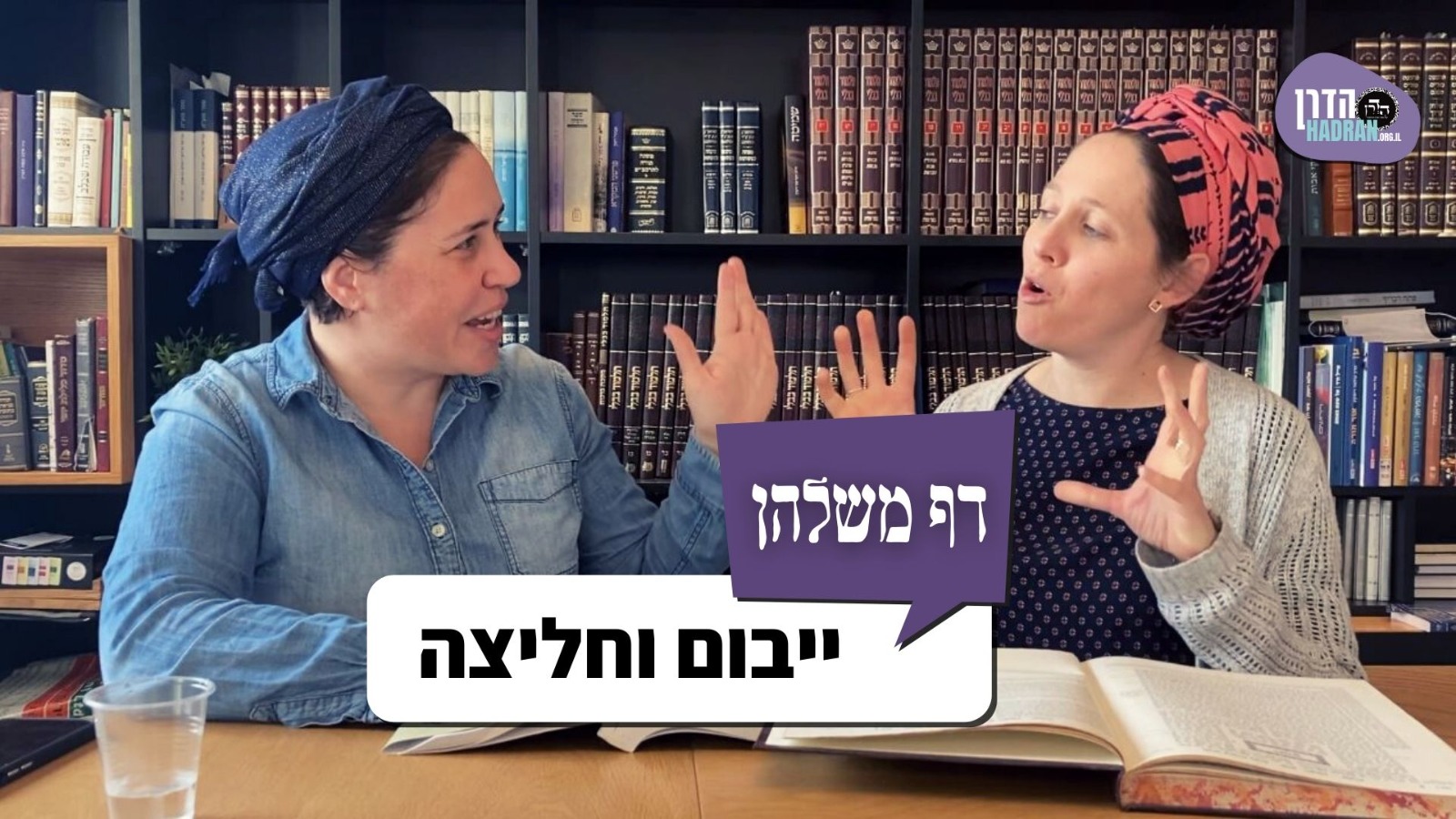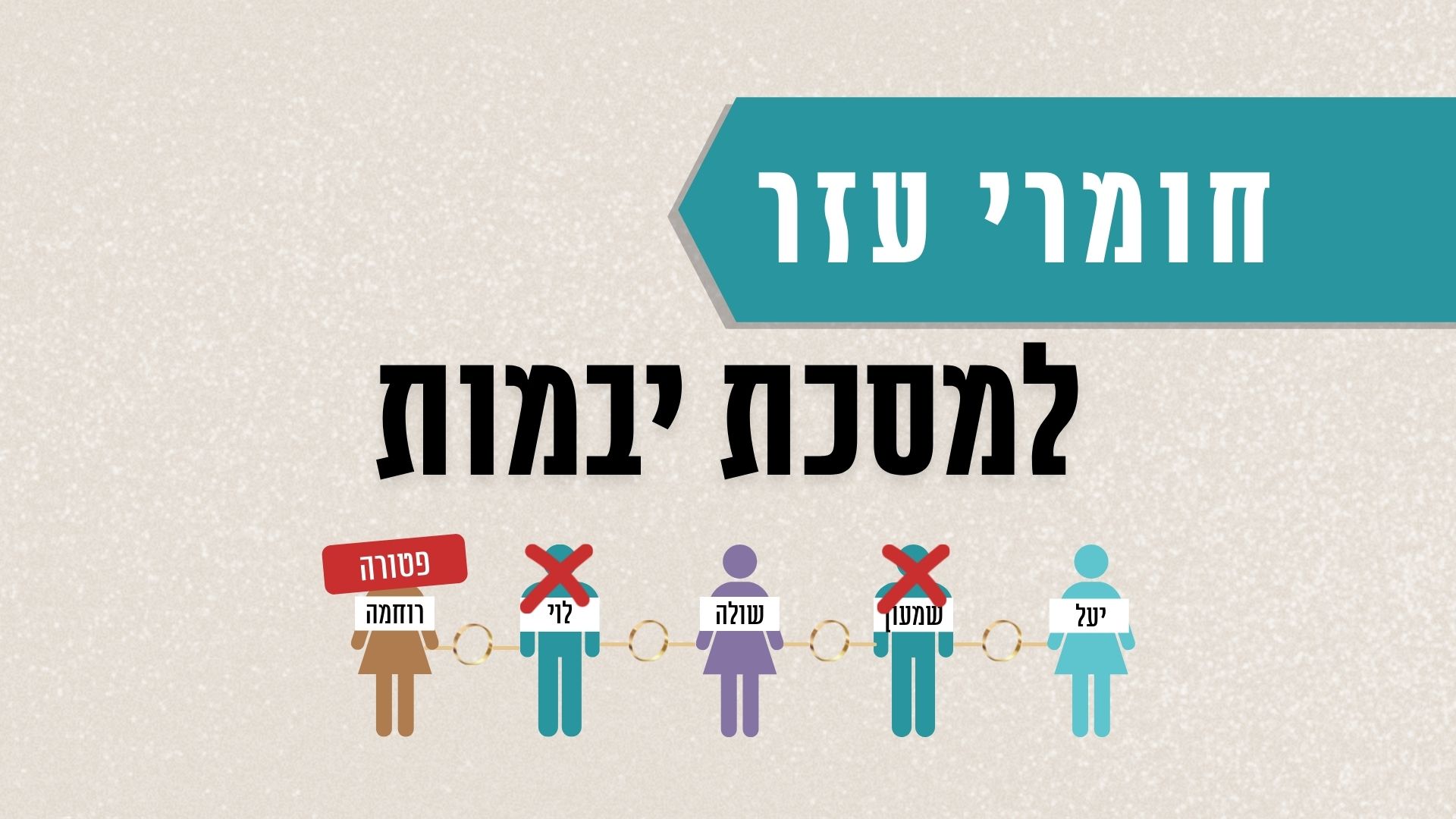יבמות ב
חֲמֵשׁ עֶשְׂרֵה נָשִׁים פּוֹטְרוֹת צָרוֹתֵיהֶן וְצָרוֹת צָרוֹתֵיהֶן מִן הַחֲלִיצָה וּמִן הַיִּיבּוּם עַד סוֹף הָעוֹלָם.
The Torah law obligating a man whose brother died without children [yavam] to marry his deceased brother’s widow [yevama] or to free her from her levirate bonds through the act of ḥalitza applies only when it is permitted for the widow to marry her surviving brother-in-law. However, in cases where the yevama is forbidden to her yavam due to her status as a close family relative, the mitzva of levirate marriage is not applicable, and she is exempt from both levirate marriage and ḥalitza.
The Sages further taught that the exemption of a yevama from levirate marriage also exempts her rival wife. In other words, if the deceased brother had two wives, each a so-called rival of the other, and only one wife is a relative of the surviving brother, then the rival wife is also exempt from both levirate marriage and ḥalitza. Moreover, if that same rival wife entered into levirate marriage with a different brother of the deceased, one to whom she is not forbidden, then were this third brother also to die childless, so that the obligation of levirate marriage would again be incurred by the second brother, not only is the forbidden rival wife exempt from levirate marriage and ḥalitza, her new rival wives from her second marriage are also exempt.
That is to say, any other wife of the third brother is exempt from the mitzva of levirate marriage, as she is the rival wife of that first rival wife, who was exempted from levirate marriage following her first husband’s death due the exemption of her original rival wife. The same principle applies if that second rival wife subsequently enters into levirate marriage with another permitted brother, and so on. In summary, every widow who is exempt from marrying her brother-in-law due to her status as rival wife of a forbidden relative is treated as a forbidden relative herself and is therefore exempt from both ḥalitza and levirate marriage and causes exemption for future rival wives as well.
MISHNA: The mishna describes various cases that invoke the principles above. Fifteen categories of women constitute familial relations that are forbidden as incestuous, and consequently, these women exempt their rival wives and the rival wives of their rival wives from ḥalitza and from levirate marriage forever, i.e., they also exempt rival wives of rival wives of rival wives, and so on.
וְאֵלּוּ הֵן: בִּתּוֹ, וּבַת בִּתּוֹ, וּבַת בְּנוֹ, בַּת אִשְׁתּוֹ,
And these women are: The daughter of the yavam, i.e., the deceased brother had married a daughter of his brother, which means that when he died childless, his brother’s own daughter came before her father for levirate marriage, and therefore she is exempt. And the same applies if the deceased brother’s widow is the daughter of the daughter of the yavam, or if she is the daughter of his son, or the daughter of his wife.
וּבַת בְּנָהּ, וּבַת בִּתָּהּ, חֲמוֹתוֹ, וְאֵם חֲמוֹתוֹ, וְאֵם חָמִיו,
And similarly, if the yevama is the daughter of the son of the wife of her yavam or the daughter of his wife’s daughter, or if she is the mother-in-law of her yavam, or his mother-in-law’s mother, or his father-in-law’s mother, then she is exempt from ḥalitza and levirate marriage.
אֲחוֹתוֹ מֵאִמּוֹ, וַאֲחוֹת אִמּוֹ, וַאֲחוֹת אִשְׁתּוֹ, וְאֵשֶׁת אָחִיו מֵאִמּוֹ,
The mishna continues its list of close relatives. If the yevama is the maternal half sister of the yavam, or if she is the sister of his mother, or his wife’s sister, then she is exempt from both ḥalitza and levirate marriage Or if she was the wife of his maternal half brother, and after this brother died or divorced his wife, she married another of his father’s brothers, who was not her relative, and this brother died, she is exempt. In this case, the obligation to enter into levirate marriage should be incurred by the surviving brother, but since she was previously the wife of his maternal brother, she is exempt.
וְאֵשֶׁת אָחִיו שֶׁלֹּא הָיָה בְּעוֹלָמוֹ, וְכַלָּתוֹ. הֲרֵי אֵלּוּ פּוֹטְרוֹת צָרוֹתֵיהֶן וְצָרוֹת צָרוֹתֵיהֶן מִן הַחֲלִיצָה וּמִן הַיִּיבּוּם עַד סוֹף הָעוֹלָם.
And the same applies to the wife of a brother with whom he did not coexist, i.e., the wife of a man who died before his brother was born. As will be explained, the obligation of levirate marriage does not apply to the yavam in this case. Since levirate marriage does not apply to him, the yevama remains forbidden to him as his brother’s wife. And the last case is if one’s yevama had previously been his daughter-in-law, and after his son had died one’s brother married her, before he too passed away. These fifteen women exempt their rival wives and the rival wives of their rival wives from ḥalitza and levirate marriage forever.
וְכוּלָּן אִם מֵתוּ אוֹ מֵיאֲנוּ,
§ And with regard to all of these women listed as prohibited relations, these halakhot apply only if they were married to the deceased brother until the time of his death. However, this is not the case if they died during the deceased brother’s lifetime, or if they refused their husbands when they were minors. This refusal is referring to the decree of the Sages that a girl under the age of twelve whose father is no longer alive may be married off by her mother or brothers. However, this marriage is not final, as she can terminate it by performing an act of refusal, i.e., by declaring, while still a minor, that she does not desire this marriage. In this case, the marriage is annulled retroactively and she is considered as though she were never married at all.
אוֹ נִתְגָּרְשׁוּ אוֹ שֶׁנִּמְצְאוּ אַיְלוֹנִית — צָרוֹתֵיהֶן מוּתָּרוֹת.
Or if those women were divorced by their husband, the deceased brother, or were found to be a sexually underdeveloped woman [aylonit], i.e., a woman who is so underdeveloped that she is not considered a woman in the full sense, these halakhot do not apply. Her marriage is considered a mistaken marriage and is null and void. In all these cases their rival wives are permitted, as the exemption for rival wives of forbidden relatives applies only when the forbidden relative was the brother’s wife at the time of his death, when the halakhot of levirate marriage came into effect.
וְאִי אַתָּה יָכוֹל לוֹמַר בַּחֲמוֹתוֹ וּבְאֵם חֲמוֹתוֹ וּבְאֵם חָמִיו שֶׁנִּמְצְאוּ אַיְלוֹנִית אוֹ שֶׁמֵּיאֲנוּ.
§ And the mishna comments that the language of this principle is imprecise, as you cannot say with regard to his mother-in-law and with regard to his mother-in-law’s mother and with regard to his father-in-law’s mother that they were found to be an aylonit, as an aylonit is sterile and therefore cannot become a mother or a mother-in-law. Nor is the mishna precise when it states: Or refused, as refusal applies only to minors, who cannot give birth.
כֵּיצַד פּוֹטְרוֹת צָרוֹתֵיהֶן: הָיְתָה בִּתּוֹ אוֹ אַחַת מִכׇּל הָעֲרָיוֹת הָאֵלּוּ נְשׂוּאוֹת לְאָחִיו, וְלוֹ אִשָּׁה אַחֶרֶת, וָמֵת — כְּשֵׁם שֶׁבִּתּוֹ פְּטוּרָה, כָּךְ צָרָתָהּ פְּטוּרָה. הָלְכָה צָרַת בִּתּוֹ וְנִשֵּׂאת לְאָחִיו הַשֵּׁנִי, וְלוֹ אִשָּׁה אַחֶרֶת, וָמֵת — כְּשֵׁם שֶׁצָּרַת בִּתּוֹ פְּטוּרָה, כָּךְ צָרַת צָרָתָהּ פְּטוּרָה.
§ The mishna explains: How do these women exempt their rival wives? If, for example, his daughter or any one of those women with whom relations are forbidden was married to his brother and this brother had another wife, and the brother died, then just as his daughter is exempt from levirate marriage, so too her rival wife is exempt. If his daughter’s rival wife subsequently went and married his second brother, to whom she is permitted, and he had another wife, and he died childless as well, which means that his wife comes before the first yavam, the daughter’s father, for levirate marriage, then just as his daughter’s rival wife is exempt, so too the rival wife of her rival wife is exempt.
אֲפִילּוּ הֵן מֵאָה.
The mishna adds: Even if they are one hundred brothers, the same logic applies. If a woman is exempt from levirate marriage because she is the rival wife of a forbidden relative or the rival wife of a rival wife of this kind, and she herself has an additional rival wife, this rival wife is also exempt and in turn exempts her own rival wives from levirate marriage.
כֵּיצַד אִם מֵתוּ צָרוֹתֵיהֶן מוּתָּרוֹת: הָיְתָה בִּתּוֹ אוֹ אַחַת מִכׇּל הָעֲרָיוֹת הָאֵלּוּ נְשׂוּאוֹת לְאָחִיו, וְלוֹ אִשָּׁה אַחֶרֶת, מֵתָה בִּתּוֹ אוֹ נִתְגָּרְשָׁה, וְאַחַר כָּךְ מֵת אָחִיו — צָרָתָהּ מוּתֶּרֶת.
How so? What are the cases in which if they died their rival wives are permitted? If, for example, one’s daughter or any one of those women with whom relations are forbidden was married to his brother, and this brother had another wife, and then his daughter died or was divorced and afterward his brother died, her rival wife is permitted to him.
וְכׇל הַיְּכוֹלָה לְמָאֵן וְלֹא מֵיאֲנָה — צָרָתָהּ חוֹלֶצֶת וְלֹא מִתְיַיבֶּמֶת.
§ The mishna states another principle: And if any of these forbidden relatives was a minor who could refuse her husband, then even if she did not refuse, her rival wife performs ḥalitza and does not enter into levirate marriage. The rival wife may not enter into levirate marriage, as she is the rival wife of a forbidden relative. However, she is not entirely exempt from levirate marriage and must be released by ḥalitza because the marriage of the forbidden relative was not a fully valid marriage, and therefore, by Torah law, the other woman is not considered a rival wife of a forbidden relative.
גְּמָ׳ מִכְּדִי כּוּלְּהוּ מֵאֲחוֹת אִשָּׁה יָלְפִינַן, לִיתְנֵי אֲחוֹת אִשָּׁה בְּרֵישָׁא!
GEMARA: The Gemara asks a question with regard to the order of the mishna’s list: Now, since the halakha that all these women with whom relations are forbidden are exempt from levirate marriage and exempt their rival wives is derived from the case of a wife’s sister, as demonstrated later, let the mishna teach the case of a wife’s sister first and only afterward mention the other instances, which are derived from that halakha.
וְכִי תֵּימָא: תַּנָּא חוּמְרֵי חוּמְרֵי נָקֵט, וְרַבִּי שִׁמְעוֹן הִיא, דְּאָמַר שְׂרֵיפָה חֲמוּרָה.
And if you would say that the tanna cited the cases in order of severity, then you must say that it is in accordance with the opinion of Rabbi Shimon, who says that execution by burning is more severe than stoning. For this reason, the tanna began with the cases of one’s daughter and his daughter’s daughter and his son’s daughter and so forth, since one who has relations with these women is punished by burning, after which the tanna listed those cases that entail a lesser penalty.
אִי הָכִי, לִיתְנֵי חֲמוֹתוֹ בְּרֵישָׁא, דְּעִיקַּר שְׂרֵיפָה בַּחֲמוֹתוֹ כְּתִיבָא! וְעוֹד: בָּתַר חֲמוֹתוֹ לִיתְנֵי כַּלָּתוֹ, דְּבָתַר שְׂרֵיפָה סְקִילָה חֲמוּרָה!
However, the Gemara argues that even so, the order of the mishna remains problematic. If so, let him teach the case of one’s mother-in-law first, as the main transgression that entails burning is written with regard to his mother-in-law, as it is stated: “And if a man take with his wife also her mother, it is wickedness; they shall be burnt with fire, both he and they” (Leviticus 20:14). And furthermore, after his mother-in-law let him teach his daughter-in-law, as after execution by burning, stoning is the most severe of the other capital punishments imposed by the courts.
אֶלָּא: בִּתּוֹ, כֵּיוָן דְּאָתְיָא מִדְּרָשָׁא, חַבִּיבָא לֵיהּ.
Rather, the Gemara retracts the previous explanation in favor of the following: With regard to his daughter, since this prohibition is actually derived from a homiletical interpretation and is not explicitly stated in the Torah, it is therefore dear to the tanna. Consequently, he listed this novel case of a daughter first.





















